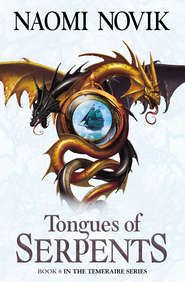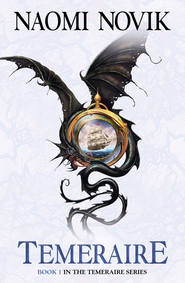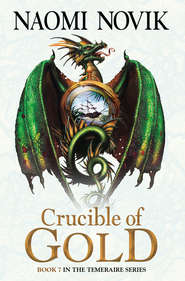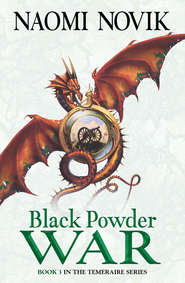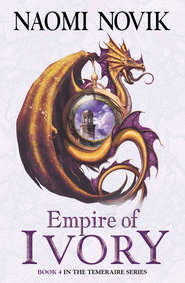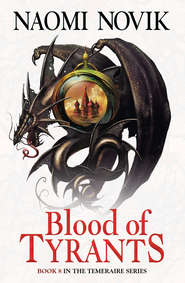По всем вопросам обращайтесь на: info@litportal.ru
(©) 2003-2024.
✖
League of Dragons
Автор
Год написания книги
2019
Настройки чтения
Размер шрифта
Высота строк
Поля
Von Karlow bowed to Laurence very stiffly; his look was unhappy and constrained. Laurence belatedly understood: they had not come so late by accident. Dobrozhnov had kept him waiting, in the cold, deliberately.
That gentleman looked better than the last time Laurence had seen him; clear-eyed and his skin no longer flushed with drink, although the bruise across his cheek had purpled. He avoided Laurence’s eyes, and said, “Well, let us get on with it,” and walked away to the other side of the clearing.
“Captain,” Hammond said, low and angry; he, too, had understood. “I will require a delay, and see if we cannot arrange for something hot to drink; the goodwife of the farmhouse, perhaps, would provide—”
“No,” Laurence said. He felt a heavy weariness and dismay, as if Dobrozhnov had gone to his knees and begged for his life. “There is no need. I have killed men in colder weather than this.”
Hammond took the dueling-pistols to the center of the clearing, and met Von Karlow there; they inspected the weapons together. Hammond took some time over the examination, and carried the pistols back with the case tucked under his arm and his ungloved hands wrapped around the guns, warming them. Laurence was grateful, for the sentiment more than the act; the fire of Hammond’s indignation lifted some of the oppression from his own spirits. He took one of the pistols, checked it, and nodded to Hammond; Von Karlow turned from his side and nodded as well. He walked back to the middle of the clearing and held up his handkerchief.
“On a count of three,” he said, “when I have dropped the handkerchief, you may fire.”
Laurence turned his side, to present a narrow target, and took aim; Dobrozhnov also turned, and Laurence was sorry to see the man’s hand trembling, a little. He did not look at the gun, or the man’s face; he looked at his chest, chose his point, and adjusted his pistol for the wind. “One,” Von Karlow said. “Two—”
Dobrozhnov fired. Laurence all in one moment heard the explosion, saw the smoke, and felt the impact in his whole body; a sharp, shocking blow, knocking the air from his lungs. Then he was on the ground, without any consciousness of the fall. “My God!” Von Karlow cried aloud. He sounded far away.
Hammond was kneeling by his side in the snow, bending over him, ashen. “Captain—Captain, can you speak? Here, Doctor, at once!”
Laurence drew a shallow breath, and another. The pain was startling, but general; he could not tell where he had been hit. Hammond’s hands were on him, and the doctor’s, opening his coat and his shirt, and then the doctor was sliding his hand down over Laurence’s back. The doctor was speaking in Russian. “Thank Heaven! He says it has gone cleanly through,” Hammond said. “Captain, do not move.”
That was not, at present, a necessary instruction; Laurence’s arms and legs felt weighted down as though by iron bands. The doctor was already working on him with needle and thread, humming to himself, a strangely cheerful noise. Laurence scarcely felt anything beyond a little pressure; a deep chill was traveling through his body. Hammond spoke to the doctor and then he bent down and took the pistol from Laurence’s hand and stood. Laurence heard him saying, with icy formality, “Sir, I hope you will agree with me that a return of fire is required, under the circumstances of this unhappy accident. I am ready to oblige your party at any time.”
“I agree, unquestionably,” Von Karlow answered, his voice harsh.
“It was an accident,” Dobrozhnov was saying, his voice trembling, “—a perfect accident. Bozhe! My finger slipped—”
He stopped talking; neither of the other two men spoke. After a moment he said, “Of course—of course. But we should see if the gentleman will recover to take his own shot—a hour can do no harm—”
“Such agitation of his wound can in no wise be recommended,” Hammond said. “Nor that he go on lying here, in cold, any longer than he has already been kept in it. I add, sir, that I will be delighted to stand for another exchange of fire, should the completion of the first not achieve a decisive result. We may alternate, and so go on as you have begun.”
“I agree to your proposal on behalf of my party,” Von Karlow said.
Their united coldness was not less palpable than the frozen ground; Dobrozhnov said, “—yes. Yes, of course.”
His footsteps crunched away a small distance, and then halted. Laurence opened his eyes. He had not been conscious of closing them. The doctor was still humming, and putting a thick compress upon the wound. The sky above had that peculiar blue brightness of a very cold day. The sun had already passed its zenith. Laurence heard, a moment later, the explosion of a second pistol, and Dobrozhnov’s exclamation.
“Well, sir?” Hammond said. “Can your party continue?”
“My arm is hit,” Dobrozhnov said.
“A graze to the off-arm,” Von Karlow said. “The wound is not grave.”
“I do not know any reason why I must wish the other gentleman harm,” Dobrozhnov said. “I am very willing to consider the matter closed.”
Von Karlow said, after a moment, heavily, “Do you consider honor satisfied, sir?”
“Under the circumstances, I think I must request a second exchange,” Hammond said. “Your party may fire whenever ready.”
There was a brief pause. Laurence was already a little more aware of himself. He would have tried to sit up; the doctor pressed his shoulders back to the ground with the firmness of a nursemaid to a small child. Laurence shut his eyes again, and heard the pistol-shot, a thick hollow wooden thump; the bullet had hit a tree.
“You may fire when ready,” Von Karlow said, after a moment.
A second shot. Dobrozhnov gasped. The doctor made an impatient grunt, and pushed himself up and left Laurence’s side. Hammond was there in his place, a moment later. “Pray hold still, Captain,” he said. “I will get the driver; we will remove you to the farmhouse in a moment.”
He stood up again. “Sir, is honor satisfied, on your side?”
“My party cannot answer, but I consider the matter closed,” Von Karlow said. “I hope you will permit me to express my regret for any irregularity; I would be glad to shake your hand, sir, if you would take my own.”
“I am very glad to do so, sir; I find no fault in your arrangements,” Hammond said.
A fence stile was brought, and the driver helped Hammond put him on it. Laurence was by then conscious only of cold; the movement caused him some discomfort, but this was brief, and he knew very little of the next passage of time. Bare tree-branches like lacework crossing over his field of vision; the warm stink of cows and pasture; the cry of several anxious chickens; the thump of a fist on a door, and then finally warmth again: they lay him near the fireplace, a roast on the spit turning and a sizzle of fat on the logs. Footsteps came and went around him; voices spoke, but they largely spoke in Lithuanian—a peculiar music not at all like Russian or German to his ear. He drifted, or slept, or dozed; then he opened his eyes and looked at the window. It was dark outside. “Temeraire will have missed me,” he said aloud, and reaching groped for something to help him sit up.
He could not manage it. He fell back gasping to the floor. A woman came to his side—he stared up at her: a girl not twenty years of age, extraordinarily beautiful with clear green eyes and dark-brown hair; she returned the stare with immense interest. A sharp word drew her away; Laurence turned his head and found her mother glaring at him, with the same green eyes. Laurence inclined his head a little, trying to convey his lack of ill-intentions, if that were necessary under the circumstances.
His chest ached. A dressing was wrapped around his body, pressing upon the ribs. Blood had not quite soaked through the topmost level on the front. “Captain,” Hammond said, kneeling beside him. “Are you—do you feel improved?”
“Temeraire,” Laurence said, saving his breath.
“Von Karlow has gone back to town,” Hammond said. “He has promised to send a message to the covert that we have been asked to stay the night at a hunting-lodge, outside the town. Pray try and rest. Are you in a great deal of pain?”
“No.” There was no use in saying anything else. Laurence closed his eyes.
Forthing read out Laurence’s note loudly: it was brief, but quite clear; Laurence would not come back to-day. “Oh,” Temeraire said, disappointed; he had anticipated with pleasure revealing the initial success of his scheme. Laurence would surely approve all his arrangements, and in particular the generosity of his offering so remarkable a reward, and the result which it had already achieved. Indeed, Temeraire had quite counted upon that approval to salve the regrets which could not help but assail him, when he thought too long about the burnished luster of the golden plates, and imagined himself handing them over.
At least he had hoped to enjoy the satisfaction of showing Laurence that he, too, was not a slave to fortune; that he was quite willing to make the most extraordinary sacrifices in a worthy cause. There did not seem to Temeraire to be any need to defer that enjoyment until the final outcome was determined; after all, he had already made the gesture, and even now suffered the pains of anticipation. Even if Bistorta should not find Eroica in the end, Temeraire had still committed himself, and might as well have the credit of so doing.
So he sighed; but he only meant to resign himself to waiting, and thought nothing more of the note, until Churki said, “There is something I don’t care for going on here. Lay that out where I can put an eye on it.”
There was a great deal of sharp authority in her tone; Forthing had automatically spread the letter open on the rock before he recalled she was not properly entitled to give him orders. But by then Churki had already bent her head, and was peering closely at the small note; she said, “I thought so; it did not sound like something Hammond would have written, and that is not his hand. Is it your Laurence’s?”
Temeraire peered at the letter very closely. It was difficult to make out the very small letters, but finally he decided that it was not.
“And the contents are too scanty for my taste. Where is this hunting-lodge, and who is their host?” Churki said. “Hammond is not given to sailing off without good reason, and he dislikes hunting extremely; whyever has he gone to such a place? None of this looks reliable. Whatever peculiar business your Laurence is engaged upon, it looks to me as though he has drawn Hammond into it, too.”
“When Laurence has only been going about town because Hammond has made him go into society!” Temeraire said, but this protest was distracted; if anything had happened, it was surely not Laurence’s fault, at all, but in every other respect he found Churki’s remarks uncomfortably plausible.
“And we will have a bad time of searching,” Churki added. “There isn’t a moon to-night.”
“Searching!” Forthing said. “What do you mean, searching: flying about and roaring and scaring good people in-doors? No talk of that, if you please. You are both working yourself up over nothing. Here’s a note that Captain Laurence and Mr. Hammond very kindly asked someone to send for them, so you shouldn’t worry when they came home a little late even though they are two sensible gentlemen perfectly able to take care of themselves, and instead here you are brewing it up into a proper conspiracy for no reason.”
“I do not think it is no reason, at all,” Temeraire said, with dislike. He did not think Forthing was as devoted to Laurence as he should have been, considering how Laurence had condescended to have him as first officer. Churki might be a little over-fretful on account of how Incan dragons were giving to stealing one another’s people, but certainly there was no harm in being cautious. “Only it would do no good anyway for us to begin flying around without knowing anything of where Laurence and Hammond are: we will never find them without some direction. Who brought the letter, Roland, and where did they get it?”
“Just one of the street boys, the ones who aren’t afraid to come near the covert,” Roland said. “We’ll see if we can catch him; like as not he’ll have gone for one of the bun-sellers down the road.” She tapped Baggy and Gerry, and went running with them for the gate of the covert.
Baggy returned the first, some twenty minutes later and out of breath. “Tisn’t my fault,” he said, when Churki demanded what was taking them all so long. “When we found him, he could only say he brought it from a message-boy who brought it this far but didn’t want to come in the covert; so we had to go after him, and it is only luck I even got that one at all. And then he said it came from an officer, a Prussian officer named Von Karlow, at a public house near the German Gate, and that is all the way on the other side of the town.”
“Ah!” Dyhern said. “Von Karlow: I know the man. I have fought with him: a good man—an honorable man. He would not send you a lie, Temeraire, I am sure.”
“There, you see,” Forthing said.






